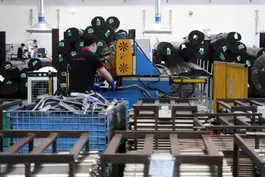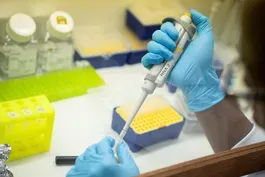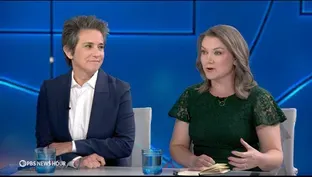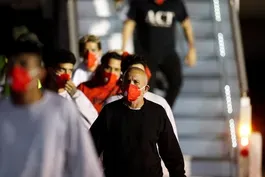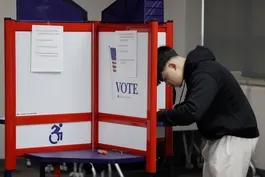
After Myanmar earthquake, China fills vacuum left by USAID
Clip: 3/31/2025 | 9m 34sVideo has Closed Captions
After devastating earthquake in Myanmar, China filling vacuum left by USAID's absence
The true impact of the massive earthquake in Myanmar is starting to reveal itself. The military government says the official death toll is more than 2,000 people and hundreds are still missing. Thousands more are injured and homeless. Nick Schifrin reports on the latest and talks with Chris Milligan, a former USAID mission director to Myanmar.
Problems with Closed Captions? Closed Captioning Feedback
Problems with Closed Captions? Closed Captioning Feedback
Major corporate funding for the PBS News Hour is provided by BDO, BNSF, Consumer Cellular, American Cruise Lines, and Raymond James. Funding for the PBS NewsHour Weekend is provided by...

After Myanmar earthquake, China fills vacuum left by USAID
Clip: 3/31/2025 | 9m 34sVideo has Closed Captions
The true impact of the massive earthquake in Myanmar is starting to reveal itself. The military government says the official death toll is more than 2,000 people and hundreds are still missing. Thousands more are injured and homeless. Nick Schifrin reports on the latest and talks with Chris Milligan, a former USAID mission director to Myanmar.
Problems with Closed Captions? Closed Captioning Feedback
How to Watch PBS News Hour
PBS News Hour is available to stream on pbs.org and the free PBS App, available on iPhone, Apple TV, Android TV, Android smartphones, Amazon Fire TV, Amazon Fire Tablet, Roku, Samsung Smart TV, and Vizio.
Providing Support for PBS.org
Learn Moreabout PBS online sponsorshipWILLIAM BRANGHAM: Welcome to the "News Hour."
The true impact of Friday's massive earthquake, which was centered in Myanmar, is now starting to reveal itself.
Myanmar's military government says the official death toll is more than 2,000 people, with hundreds still missing.
Thousands are injured and now homeless, as local and international efforts turn from rescuing survivors to recovering remains.
Nick Schifrin begins our coverage.
NICK SCHIFRIN: Three days after the earthquake shook this monastery to the ground, the victims are finally being recovered.
Nearly 300 monks lived here.
Fifty are confirmed dead, the fate of 150 more unclear.
In Mandalay, the powerful earthquake pulled buildings to the ground, collapsed hotels and destroyed an entire apartment complex.
A shop owner who wanted to stay anonymous shows the scars from the building that collapsed on top of him.
He was rescued after being trapped for hours.
MAN (through translator): I have been removing the debris from my shop on my own.
No one has helped me.
NICK SCHIFRIN: In neighboring Thailand, Friday's terrifying collapse of a high-rise under construction sent people running for their lives.
Today, at the site, they recovered one of the 18 who were killed.
Authorities are investigating why the tower fell, when the damage to the rest of Bangkok was minimal.
The epicenter was near Mandalay, Myanmar's second largest city, but the impact of the 7.7-magnitude quake spread to rural areas that today have little communications and are still stranded.
Years of civil war following the 2021 military coup has left more than three million people displaced, and local media report fighting continued even this weekend between resistance groups and the military.
International aid organizations such as the U.N.'s Children's Fund and World Food Program are working to deliver relief.
SAI HAN LYNN AUNG, Chief, UNICEF Field Office in Mandalay: We know this is an absolute catastrophe for children and family across Mandalay.
Many homes have been destroyed, road and bridge damaged.
Many children and family are still missing and traumatized.
NICK SCHIFRIN: One of the most visible rescue teams has been Chinese.
This morning, Chinese rescuers pulled a child out of the rubble, the team's successes broadcast on Chinese TV.
WOMAN (through translator): The Chinese rescue teams came to help us.
Thank you very much.
I hope I can express my gratitude to the Chinese rescue teams on behalf of all the people in the affected areas.
NICK SCHIFRIN: In Washington, the State Department announced a humanitarian aid team would soon arrive and deny that USAID cuts prevented a U.S. response.
TAMMY BRUCE, State Department Spokesperson: The aid can continue, and it may simply look different, and it may involve more partners.
The success in the work and our impact will still be there.
NICK SCHIFRIN: But a log written by current USAID employees and obtained by "PBS News Hour" says that on Friday afternoon disaster response experts working on the earthquake received alerts that they should go home; 45 minutes later, they were told if they had urgent or critical needs, they could continue to work as necessary.
The log goes on to say -- quote -- "The U.S. government no longer has the tools or personnel to respond when our global neighbors request assistance."
For a perspective on this, we turn to Chris Milligan, who previously held the most senior career position at USAID during the last Trump administration, and prior to that was the agency's mission director to Myanmar.
Chris Milligan, thanks very much.
Welcome.
CHRIS MILLIGAN, Former Senior USAID Official: Thank you for having me.
NICK SCHIFRIN: What is your assessment of the U.S. response to the earthquake that happened on Friday so far?
CHRIS MILLIGAN: There really hasn't been a response.
Normally, what would happen if there was a natural disaster like this, the U.S. government would deploy a disaster assistance response team within our.
And this disaster assistance response team would be composed of technical experts in sectors like search-and-rescue, water, hygiene that would save lives.
For example, when there was the massive earthquake in Turkey in '23, the U.S. government deployed a disaster assistance response team that grew to about 200 people, and 160 of those were search-and-rescue staff.
NICK SCHIFRIN: And just to give us perspective, the State Department spokesperson, Tammy Bruce, said today that a team from USAID was traveling to Myanmar now to help identify its most pressing needs, and the U.S. pledged $2 million in humanitarian assistance.
It sounds like what you're saying is that that is not how things used to work.
CHRIS MILLIGAN: Correct.
It's too little and too late.
The three individuals, although I respect that they're humanitarian assistance advisers, are not specific technical experts across the fields that are required at this time.
This does not replace a 200-person DART, or disaster assistance response team.
When there is a natural disaster, the U.S. government provides well more than $2 million to help those in need.
NICK SCHIFRIN: And not only that, timing, right?
Why are the first 72 hours so critical after an earthquake?
CHRIS MILLIGAN: They're called the golden hours.
If you can find people and rescue them, then they have a chance of surviving.
You have to get in there quickly to save lives.
And the next thing you have to do is prevent a secondary wave of loss of life by ensuring that there is adequate clean water, food, and shelter.
NICK SCHIFRIN: And on both of those notes, let's put them in perspective for the recent USAID cuts overall.
A congressional official tells me that the transport contracts that could have moved the dogs, the search-and-rescue teams, those transport contracts have been terminated and that was notified to Congress.
And an employee recently let go from USAID confirmed to me that some of the programs that regional offices could have been using in circumstances like the earthquake in Myanmar, those programs have also been cut.
What is the impact of those cuts, the overall cuts on USAID on a moment like this?
CHRIS MILLIGAN: The real-world impact is that the agency and the United States government does not have the capacity to help those in need.
Those cuts that you mentioned occurred.
But there are other cuts that are also significant.
The internal programs inside the country were cut.
So our ability or USAID's ability to pivot those programs to address the immediate needs of Mandalay doesn't exist anymore either.
The relationships with the local individuals and local leaders don't exist anymore either.
NICK SCHIFRIN: And I want to read that sentence that I read from the log from current USAID officials... on Friday -- quote -- "The U.S. government no longer has the tools or personnel to respond when our global neighbors request assistance," do you agree with that?
CHRIS MILLIGAN: I agree with that.
We had the capacity.
We had the assets.
We chose to turn them off, and now people are dying.
NICK SCHIFRIN: Let's talk about some of the soft power aspects of this.
In the report we just showed, Chinese rescue officials are seen pulling bodies out of the rubble.
What's your response when you see and hear that?
CHRIS MILLIGAN: Yes.
We provide humanitarian assistance because we're a generous country, and we do it based upon needs.
However, there is a big dividend back here for America.
It shows -- it's a showcase of American values.
It creates goodwill.
It strengthens our partnerships in the world, and it supports our global leadership.
By walking away from humanitarian assistance, we are creating a political void that others, such as China, can fill for their own advantage.
NICK SCHIFRIN: And does that hurt national security?
CHRIS MILLIGAN: What would a world look like without USAID?
It means more pandemics, pandemics coming to America.
It means less jobs for Americans; 11 of the top 15 trading partners we have were recipients of foreign assistance, $2 billion in agricultural products purchased by USAID to go overseas, a billion dollars in pharmaceuticals.
The list goes on and on.
It's a less stable world, more conflict, more demands on American soldiers.
It's a less free world, and it's a world where China becomes the global leader.
NICK SCHIFRIN: And, finally, you worked, as I said, as the senior career official, the counselor under USAID under the first Trump administration.
What was your experience then, and how does it compare to how current USAID employees are being treated?
CHRIS MILLIGAN: USAID had a very positive experience under the first Trump administration.
Together, we instituted reforms that made USAID more fit for purpose to address global challenges.
So it was a very positive experience.
We are not -- the agency, as you know, being decimated and abolished, this is not the same experience.
NICK SCHIFRIN: And, to that point, USAID employees would have been willing to work with this Trump administration?
CHRIS MILLIGAN: Of course.
I have worked across six different presidential administrations.
I was one of the first civilians in Iraq for the Iraq War under a Republican administration.
We don't do politics.
We do national security.
NICK SCHIFRIN: Chris Milligan, thank you very much.
CHRIS MILLIGAN: Thank you.
A pleasure.
Thank you.
Examining claims tariffs will revitalize U.S. manufacturing
Video has Closed Captions
Examining Trump's claims that tariffs will revitalize American manufacturing (7m 42s)
News Wrap: Le Pen banned from public office after conviction
Video has Closed Captions
News Wrap: Le Pen banned from public office in France after embezzlement conviction (4m 20s)
Scientists sound alarm on Trump's research funding cuts
Video has Closed Captions
Scientists sound alarm on Trump administration's dismantling of research funding (6m 44s)
Tamara Keith and Amy Walter on Florida, Wisconsin elections
Video has Closed Captions
Tamara Keith and Amy Walter on what this week's elections mean for Trump and Democrats (8m 29s)
Trump deports more immigrants amid battle with judiciary
Video has Closed Captions
Trump administration deports more immigrants to El Salvador amid battle with judiciary (7m 56s)
Wisconsin Supreme Court election highlights political divide
Video has Closed Captions
Wisconsin Supreme Court election highlights deep political divides in battleground state (6m 50s)
Providing Support for PBS.org
Learn Moreabout PBS online sponsorshipMajor corporate funding for the PBS News Hour is provided by BDO, BNSF, Consumer Cellular, American Cruise Lines, and Raymond James. Funding for the PBS NewsHour Weekend is provided by...
